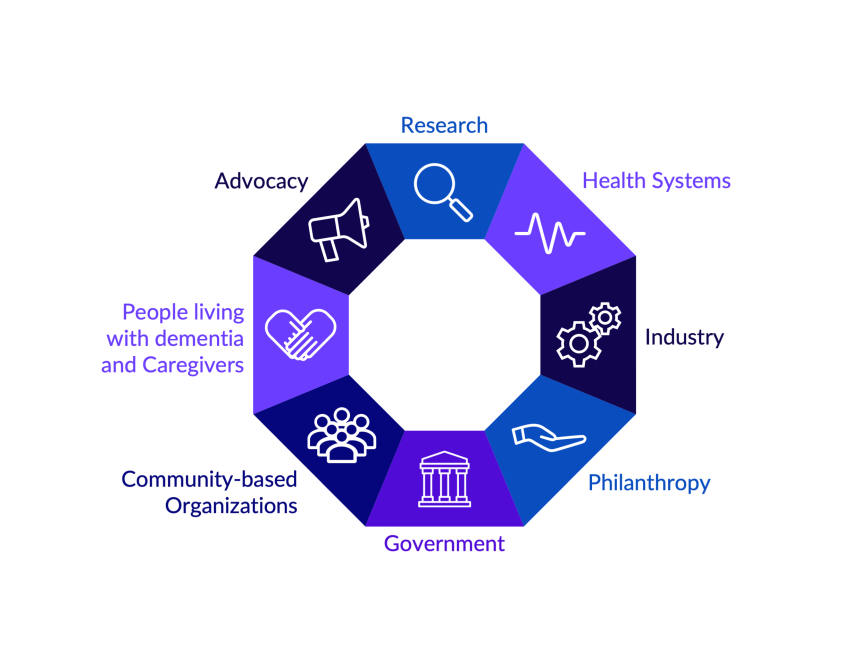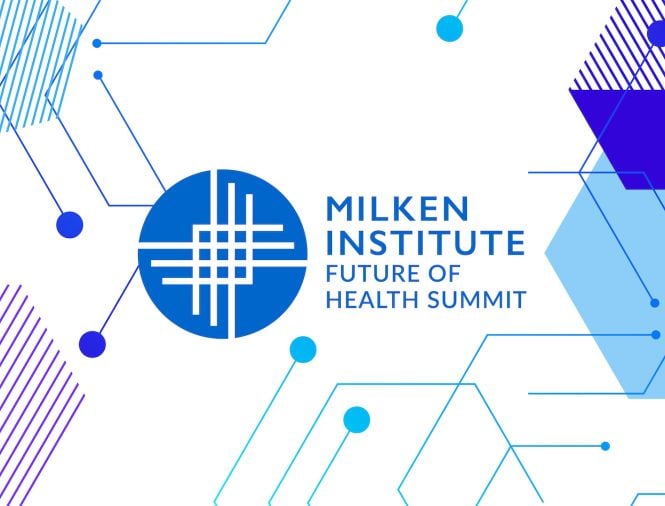

Brain Health
Mind the Gap: Investing in Dementia as an Opportunity to Extend Healthspan

 CP
CP
Mind the Gap: Investing in Dementia as an Opportunity to Extend Healthspan

 CP
CP
In our signature program, the Alliance to Improve Dementia Care, we bring together a multi-sector coalition of leaders to uncover the latest breakthroughs in brain health and we work to increase timely detection, improve access to treatment, coordinated care, and address health equity for people at risk for or living with dementia and their caregivers. Through expert workgroups, convenings, collaborative initiatives, and thought leadership, the Alliance amplifies and promotes the adoption of proven polices, solutions, and promising innovations in dementia care.
The Alliance to Improve Dementia Care
The Alliance Aims to Accomplish These Goals:
Unite a cross-sector coalition: Convene and engage diverse stakeholders, including health systems, industry, research, advocacy groups, community-based organizations, philanthropy, government, and, most importantly, individuals with lived experiences, to foster collaboration and alignment in dementia care efforts.
Identify and scale best practices in dementia care delivery: Ensure individuals receive high-quality, evidence-based care by identifying, amplifying, and scaling best practices in early and accurate diagnosis, treatment, and comprehensive care through value-based payment models.
Advance policy and regulatory solutions: Work with federal, state, and local advisory boards, agency leaders, and elected officials to overcome long-standing care and financing barriers and advance scalable solutions.
Strengthen a dementia-capable workforce and community: Develop and promote policies that build a dementia-capable workforce across the care continuum, equip employers to support employees affected by or caring for someone with dementia, and expand community-based resources with better prevention, detection, and care resources.

Brain Health
Highlights

Mind the Gap: Investing in Dementia as an Opportunity to Extend Healthspan
We are living through an age of remarkable longevity. Globally, the number of people aged 60 and over is projected to double in the next 25 years. But this longevity boom masks a critical problem: the growing gap between lifespan and...Read Report
 CP
CP

Improving Early Detection of Cognitive Impairment and Dementia
DOWNLOAD REPORT The prevalence of mild cognitive impairment (MCI) and dementia is increasing as advancements in medicine, public health, and living standards extend human lifespans. Approximately 12–18 percent of Americans aged 60 and older...Read Report SM
KP
SM
KP

Guiding the Care Journey: Building Dementia Workforce and System Capacity through Care Navigation
This report covers the challenges that the US health-care system is facing as it prepares to meet the growing demand for care among individuals living with Alzheimer’s disease and related dementias (ADRD). It suggests that implementing care...Read ReportMM DT

Projected Prevalence and Cost of Dementia: 2022 Update
The 2022 update on Alzheimer's Disease and Related Dementias (ADRD) highlights that: The treatment prevalence and related costs have significantly increased in the past 10 years → + 31 percent since 2012 to $2.43 million. The latest...Read Report



Roadmap for Investment in Dementia Care
On average, people with Alzheimer’s disease and frontotemporal dementia live six to ten years after diagnosis. People with vascular dementia and Lewy body dementia live on average five to six years after diagnosis. A great deal can and...Read Report
 CL
NS
CL
NS


Scaling Comprehensive Dementia-Care Models
Despite scientific progress over the past 25 years, dementia remains one of the toughest health-care challenges. Alzheimer’s disease is the sixth-leading cause of death in the United States, and the number of deaths from all related...Read ReportNS MMNora Super andMac McDermott
Building Workforce Capacity to Improve Detection and Diagnosis of Dementia
The Alliance to Improve Dementia Care, part of the Milken Institute’s Center for the Future of Aging, utilizes a multi-sector approach to develop recommendations to improve care for individuals living with dementia across all stages...Read ReportMM

Better Brain Health through Equity: Addressing Health and Economic Disparities in Dementia for African Americans and Latinos
'Better Brain Health through Equity: Addressing Health and Economic Disparities in Dementia for African Americans and Latinos' centers around two overarching themes: (1) Strengthening the infrastructure among health-care, long-term care...Read ReportCLCara Levy
Reducing the Cost and Risk of Dementia
Increased longevity is perhaps one of the greatest success stories of our modern public health system. But along with this success comes one of our greatest challenges to healthy longevity. As we age, the risk of neurodegenerative disease...Read ReportNSNora Super
Featured Event Sessions
 Brain Check: Innovations in Prevention, Detection, and Intervention for Neurodegenerative DiseaseInnovations in Prevention, Detection, and Intervention for Neurodegenerative Disease
Brain Check: Innovations in Prevention, Detection, and Intervention for Neurodegenerative DiseaseInnovations in Prevention, Detection, and Intervention for Neurodegenerative Disease Federal Brain Boost: Advancements and Next Steps in Dementia Care2023 Future of Health Summit Session
Federal Brain Boost: Advancements and Next Steps in Dementia Care2023 Future of Health Summit Session Advancing Whole-Person Health: Breaking Down Silos in Chronic Disease Prevention2023 Future of Health Summit Session
Advancing Whole-Person Health: Breaking Down Silos in Chronic Disease Prevention2023 Future of Health Summit Session Lifestyle Medicine for the Brain: A Conversation with Deepak Chopra and Seth Rogen2023 Global Conference Session
Lifestyle Medicine for the Brain: A Conversation with Deepak Chopra and Seth Rogen2023 Global Conference Session Dementia: Addressing the Stigma of America's Most Feared Diagnosis2021 Future of Health Summit Session
Dementia: Addressing the Stigma of America's Most Feared Diagnosis2021 Future of Health Summit Session Reducing Health and Economic Disparities in Dementia Care2020 Future of Health Summit Session
Reducing Health and Economic Disparities in Dementia Care2020 Future of Health Summit Session
Featured Thought Leadership
Milken Institute calls for greater investment in dementia research and development to help boost global healthspan and longevity.
Cognitive health doesn’t have to decline with age. Here’s how to stay sharp.
As benefit leaders continue to explore innovative ways to invest in employee wellness, it might be high time they turn their attention toward brain health.
More and more adults are juggling full-time work and caregiving responsibilities — and it’s costing employers about $33 billion a year in lost productivity and employee retention, said Diane Ty, managing director of Milken Institute Future of Aging and co-author of the institute's report on the issue.
Read Article
“What can I do to take good care of my brain so I do not come down with dementia like my mother?” I will never forget the first time Helena asked me that question while sea ted at her mother’s bedside.
Read Article
Nearly 7 million seniors in the United States are living with Alzheimer’s disease, and 11 million more people provide unpaid care for a family member or friend with dementia.
Eat well. Move more. Stress less. Connect with others. These lifestyle factors, when applied intensively, may slow the progression of mild cognitive impairment (MCI) and dementia due to Alzheimer’s disease, according to a recent study published in Alzheimer’s Research & Therapy.
Read Article
Much of my work over the past decade has focused on creating, implementing, and testing new models of care for people living with dementia and their caregivers.
Read Article
Leaders
Alliance to Improve Dementia Care Steering Committee
Join the Alliance
The Alliance to Improve Dementia Care is supported by steering committee members: AARP, Alzheimer’s Association, Alzheimer’s Drug Discovery Foundation, Bank of America, Biogen, BrightFocus Foundation, CaringKind, Edward Jones, Eisai, Eli Lilly and Company, Genentech, the Institute for Healthcare Improvement, the John A. Hartford Foundation, Lundbeck, Novo Nordisk, the Scan Foundation, Washington University in St. Louis, and the Gary and Mary West Foundation.